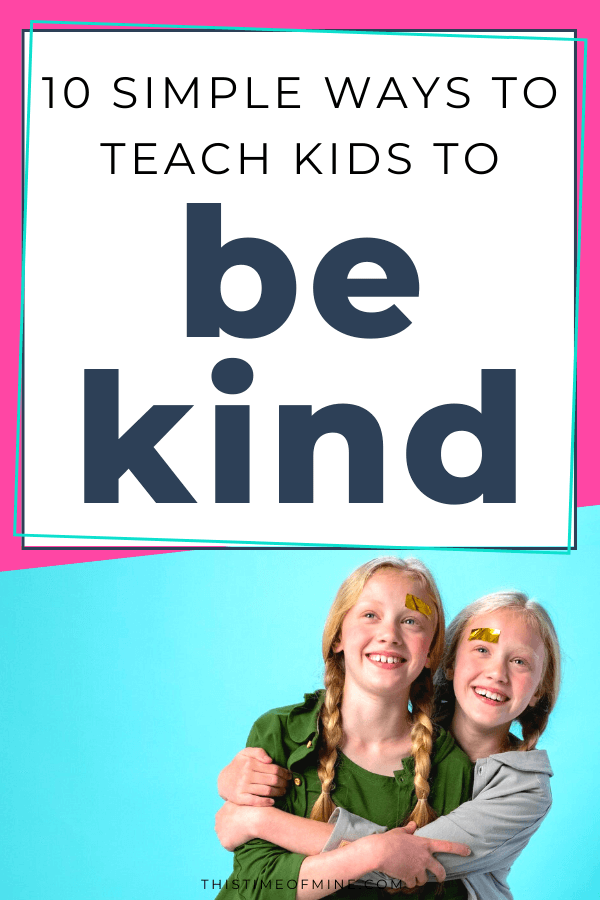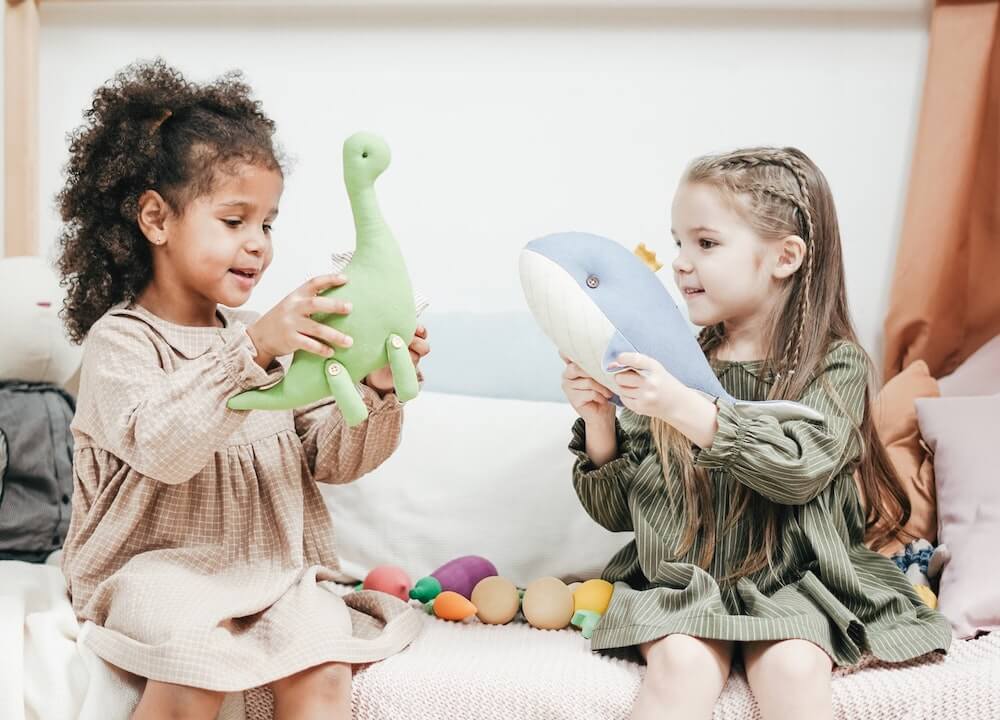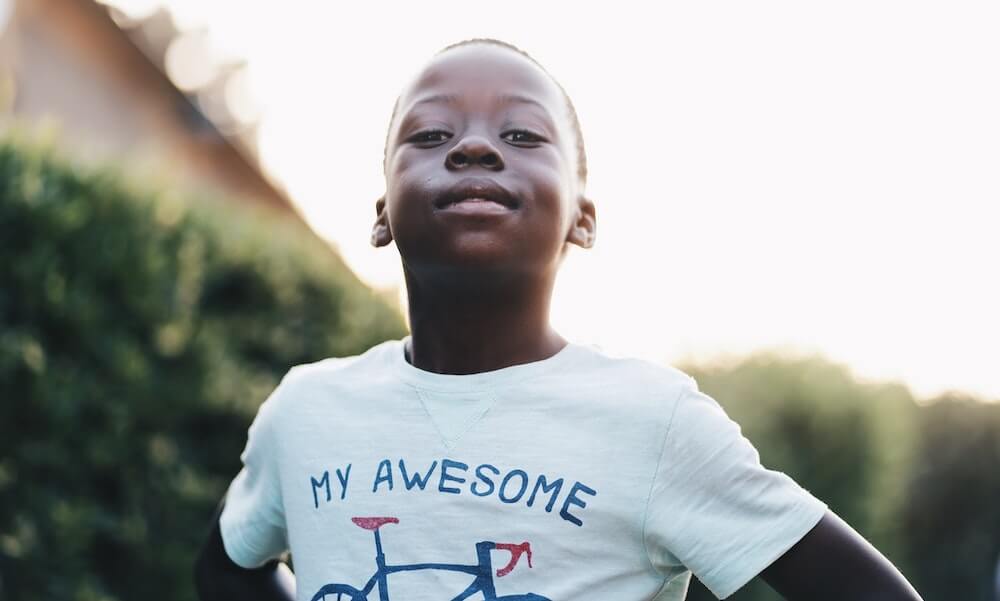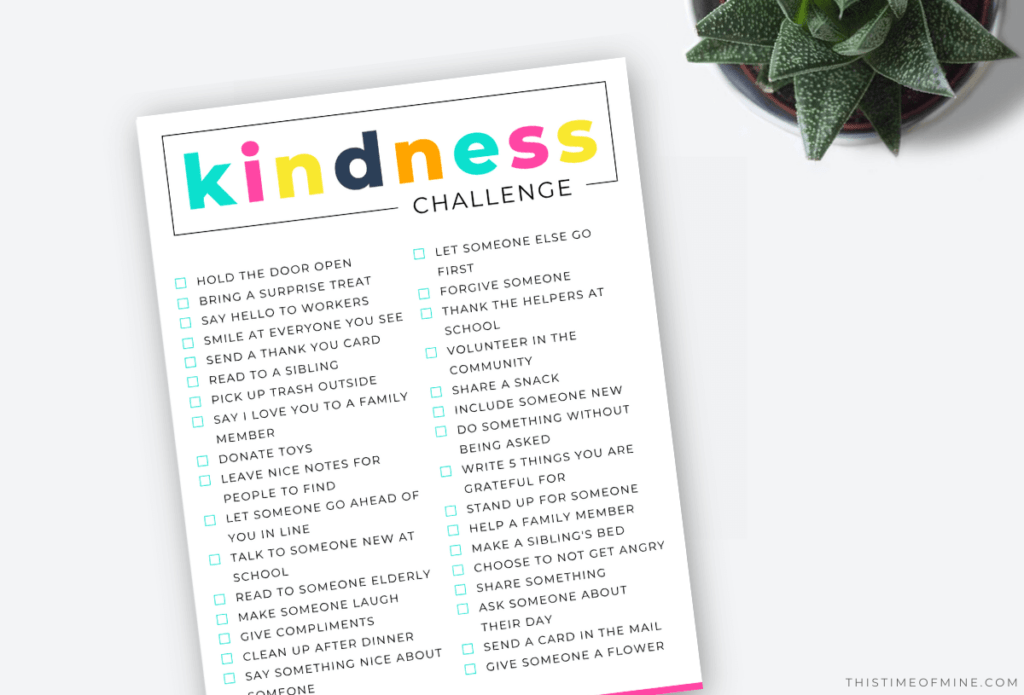10 Simple Ways To Teach Kids To Be Kind
Being nice takes practice! Here are 10 little ways to encourage kindness that teach kids to be kind, helpful, generous, and happy!

“Be nice!”
If you have kids, chances are you’ve said that a time or two (or three, or four…). But what does “being nice” actually mean?
Does it mean that our kids should just give in to the situation they’re in? Not at all.
Sometimes, we can accidentally teach our kids that being kind means being passive. But if we want our kids to truly understand kindness, they need to know that being kind actually means being strong.
Especially when it requires us to put others’ needs first. Or when we need to stand up for ourselves and other people.
When we actively teach our kids to be kind, rather than only bringing it up when they’re in trouble, we can help them understand that kindness is a way of thinking about the world and seeing the people in it. And that it’s a skill to develop, not a chore to be completed.
But before we dive in to the 10 easy ways to teach kids to be kind, it’s important to understand how kids will learn this skill.
KIDS LEARN TO BE KIND IN 3 STAGES
As kids age, their motivation for being kind changes. All three are good and show differing levels of understanding.
- Stage 1: Children love to help others because it helps them get what they want (including smiles and hugs).
- Stage 2: Children learn to be kind because they get praise, recognition, or awards.
- Stage 3: Children start to anticipate the needs of others, and become intrinsically motivated to do nice things for the people in their lives.
As kids progress through each stage, our role as teacher changes. By Stage 3, we step into more of a supportive and observatory role. We also get the benefit of watching our kids step into the leading role and become actively kind people.

HOW TO TEACH KIDS TO BE KIND
Here are 10 simple things you can do to encourage kindness in your kids and help them get to Stage 3.
1. TEACH YOUR KIDS TO NOTICE OTHERS
As human beings, we naturally tend to focus on ourselves and our needs. But the real magic comes when we learn to notice people around us.
It’s easy for kids to notice the people they interact with intentionally, like friends, family and teachers. But what about the everyday people that can blend into the background such as bus drivers, crossing guards, janitors, or quiet kids at school?
When our kids can learn to say hi, offer a smile, or include a new child into their circle of awareness, they’re developing skills that will help them become socially aware and emotionally mature.
WHAT PARENTS CAN DO:
We don’t need to force our children to say hi to everyone, especially if they’re naturally on the shy side. Instead, we can model the behavior by saying hi and being warm and welcoming to the people around us.
And even more importantly, we can talk about other people. A lot. I don’t mean sneaky, gossip talk. I mean talking out loud about the good things we notice about others. We can make simple observations such as:
- “There’s Mr. Johnson!”
- “Isn’t that baby so cute?”
- “Suzan seemed so quiet today. I wonder if she’s okay.”
- “That librarian is always so helpful.”
And the more our kids hear us speak kindly about others, the more they will develop their own vocabulary and ability to notice and appreciate the people around them.
2. PROVIDE OPPORTUNITIES FOR THEM TO EXPRESS GRATITUDE
“Thank you” is one of the most important phrases in the English language. In fact, studies have shown that children who learn to feel and express gratitude tend to be happier and more optimistic. This in turn allows them to use their strengths to improve their communities and give social support to others.
In other words, they develop the ability to be kind.
But there is a reason gratitude is considered a “practice”. It’s a muscle that needs to be developed. A skill that, without practice, can disappear.
Here are a few simple ways kids can practice gratitude:
- Write thank you letters.
- Leave nice notes for people to find.
- Family rituals of sharing what everyone is thankful for at dinner.
- Expressing gratitude in prayer.
- Keeping a gratitude journal.
- Saying “thank you” whenever they are helped.
WHAT PARENTS CAN DO:
We can take this a step further by helping kids to look on the bright side. When we practice being optimistic and working through difficulty in our own lives, our kids will notice. And we can help our kids practice this as well by being an emotional support and coaching them through their own difficulties.
And like any skill, the more we practice being grateful, the more natural it will become.
3. ENCOURAGE YOUR KIDS TO SHARE
I’m not talking about sharing toys here. I’m talking about sharing abundance. You see, we’re all blessed with abundance in one way or another. And when we’re able to notice it, we can share it with others.
Luckily, kids are naturals at this. Have you ever noticed how much they love giving? They pick flowers, they draw pictures, they create things…and they love seeing the smiling faces of their lucky recipients.
So build on their natural desire to share parts of their world!
Not only will your kids learn to be generous and thoughtful, but they’ll also learn to notice and be grateful for the things around them.
WHAT PARENTS CAN DO:
Encourage your kids to share by helping them realize that what they have is worth sharing. Then brainstorm with them as they think of people to give to. Here are a few ideas of what they could share:
- Flowers from the yard
- Extra goodies from baking
- Pictures
- Other art/creations
- Donations of old toys/clothes/books
- Acts of service, especially things they’re talented in

4. MAKE KINDNESS A FAMILY THING
As a parent, I’m sure you want your home to be filled with love and mutual respect. I know I certainly do.
So how can we do this?
One way is to allow everyone to contribute more to the family unit. When we teach our kids to help out around the house and include them in common responsibilities, they learn how their actions impact others. They also learn to put others above themselves.
So provide opportunities for your children to help out. Make chores a regular part of your weekly routine. Notice and compliment your kids when they go above and beyond their duties. And work right alongside them.
These things aren’t easy. They take a lot of effort (and patience) on our part. But the payoffs are just too good to pass up.
WHAT PARENTS CAN DO:
Hold the criticism. It takes time (and a LOT of practice) for our kids to learn household skills. Rather than constantly critiquing, consider yourself a coach. Help them learn. And be sure to praise their efforts, rather than point out their mistakes.
This works for any age. For example, my potty-training daughter once snuck in the bathroom with me, put her hand on my cheek and told me I was “so brave”. Earlier that day, she was terrified to use the toilet and I told her she was “so brave” for trying.
See? You never know what will sink in!
5. BE ACTIVE IN THE COMMUNITY
When we think of being active in our communities, we often think of things we can do as adults. But kids can be contributing members of society too.
Simple gestures such as honoring commitments, picking up trash outside, and donating items around the house will teach your kids that being kind can go beyond their immediate circle.
WHAT PARENTS CAN DO:
Hold a family meeting and discuss ways your family can help someone less fortunate. Or look for volunteer opportunities your family can do together such as rake leaves, clean up a park, or help at a community event.
6. TALK ABOUT KINDNESS USING EVERYDAY SITUATIONS
Make kindness a regular discussion topic in your family. Rather than shield them from the uncomfortable, talk about injustices you see in tv shows or movies. Talk about current events. Help them see that we live in a diverse world where people look, feel, and act differently.
And pick up on what your children say.
Our kids experience and witness injustices all the time. At school, at sports practice, with friends…Listen when they tell you about their day. If something difficult comes up, be a good listener.
They might not want your input right then, but when they’re ready, use their story as an opportunity to teach what it means to be kind. And help them come up with action plans for dealing with similar situations (or kids) in the future.
WHAT PARENTS CAN DO:
Sometimes, being kind means standing up for people. But that can be scary, especially for kids. So find opportunities to teach them how. Talk through scenarios at the dinner table, during family meetings, or even in casual moments throughout the day.
Knowing what to do beforehand will give them courage to do what’s right if the opportunity ever arises.
7. HELP YOUR KIDS LEARN TO MANAGE THEIR FEELINGS
Anger is a human emotion, and we all experience it. But if we don’t learn to control it, we can be unkind. This is true for kids as well.
Preventative maintenance, such as getting enough sleep, eating well and moving their bodies, is helpful for kids. But they also need tools for when they do get mad. Help them come up with healthy ways of managing their anger such as breathing, jumping, spending time alone, or whatever works with their personality.
WHAT PARENTS CAN DO:
Take care of you. It will be much easier to manage difficult emotions and behaviors in your kids when you’re in a good place. The Peaceful Parent Starter Guide is a free guide that walks you through 3 simple steps for staying in control.
Also, practice being a good listener. Often, our first instinct as parents is to jump in and offer advice when our kids come to us. Instead, just listen. Sometimes that’s all they need. You can teach them something later.
8. FILL THEIR CUPS
When it comes to raising children, connection should be our top priority. Meaningful interactions, no matter how small, help our kids grow in confidence and resilience. That’s when we can build them up. And when their cups are full, they won’t be a need to tear others down.
We can teach our kids to be kind simply by making sure their emotional needs are met.
WHAT PARENTS CAN DO:
You interact with your kids all the time. But in the midst of busy schedules and multiple kids, those interactions can easily become routine and surface.
Challenge yourself to make meaningful connections with each child daily. Use the time you’re already spending together to ask questions about their lives and interests, listen to them talk, or laugh together.
Also, notice the things they’re doing well and make sure to compliment their efforts. For other ways to parent with more intention, be sure to read this post.

9. MAKE TIME TO TEACH YOUR KIDS HOW TO BE KIND
It’s true that some of our best teaching happens during everyday moments. But sometimes, we need to have a more formal approach – even when it comes to teaching our kids to be kind.
Kids are naturally inclined to be kind, but there are times when they don’t quite have the words or skills yet. Here are some ways to empower them:
- Roleplay how to include someone who is being left out.
- Help them understand what gossip is.
- Teach them how to introduce themself.
- Teach them how to introduce people to each other.
- Talk through “what if” scenarios and come up with action plans.
- Have them identify examples of kindness they’ve witnessed.
- Teach them how to politely decline things they don’t want to do.
- Have them practice shaking hands and looking people in the eye when they say hello. (They can practice with you.)
- Help them understand when to come to an adult for help.
- Implement a no-secret policy in your family.
WHAT PARENTS CAN DO:
Hold regular family meetings to discuss topics that are important to you. Give your kids the opportunity to teach lessons too. You can find other, less formal, times to teach as well such as family dinner, one-on-one time, or even while doing the dishes together.
And to help kids take their learning into their own hands, have them set kindness goals!
10. SET THE EXAMPLE
If we want to teach our kids to be kind, we can’t leave it up to chance. Because although kids are naturally wired to be kind, they need continued guidance from us to stay on that path.
And the best way to lead and teach is by example.
But as busy parents, we do a lot of things that aren’t seen by our kids. Luckily, it’s pretty easy to perform small, everyday acts of kindness in front of our kids. We just have to be aware of the opportunities so we can take advantage of them.
Head here for 30 easy little ways to show kindness as you go about your day. They’ll help your kids see what kindness looks like and give them skills to mirror that kindness in their own actions.
WHAT PARENTS CAN DO:
It’s no secret that parenting is hard work, which is why moms are no strangers to stress. Learning how to manage that stress, though, will help you become even better at setting a good example for your kids.
Being kind comes a lot more naturally when your own cup is full.

KIDS CAN TEACH US HOW TO BE KIND, TOO
Parents love filling their toolbelt with tips, tricks and advice. I know I do – because raising kids is hard!
But at the end of the day, our kids usually teach us more than we teach them. Sometimes we just need to step back and watch what they can do.
There are so many ways to teach kids about being kind. This post covered only a few. Do you have anything you’d add to this list? I’d love to hear your ideas in the comments!
(For a free copy of this Kindness Challenge, head to the Parenting Library.)
OTHER HELPFUL POSTS:
- 30 Little Ways To Set A Good Example For Your Kids
- Look On The Bright Side: 7 Secrets To Raising Optimistic Kids
- How To Be A More Intentional Parent Every Day
- The Truth About Secrets: 4 Reasons Our Kids Don’t Keep Secrets
want to remember this?
PIN IT TO YOUR FAVORITE BOARD
Share this article:





I am happy to see this article again. I will share it with my friends and family this time.
What a heartwarming read! Small acts of kindness can make a big difference. 🌟 Check out my friend’s article on spreading kindness to kids for even more inspiration: https://aliciaortego.com/acts-kindness-kids/ 💖 Let’s create a ripple of kindness together!
All your advice is great. We need to teach our kids proper attitude so they will grow as better people. No matter how busy we are, give time to your kids.